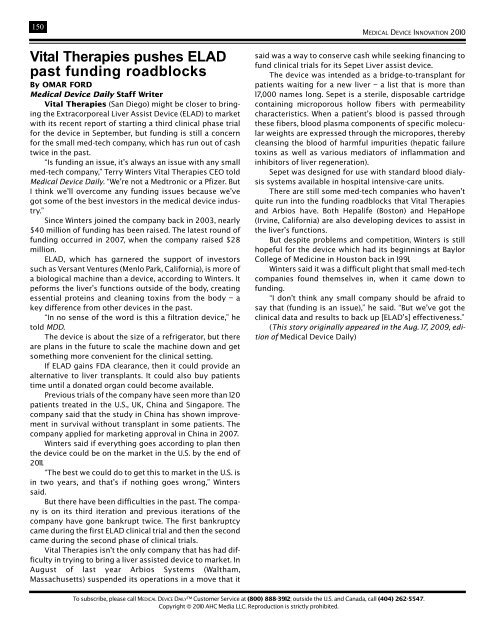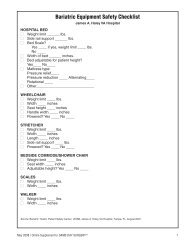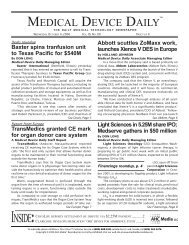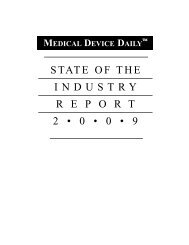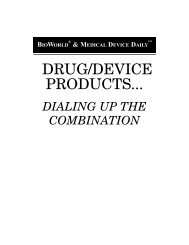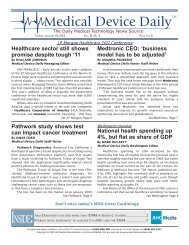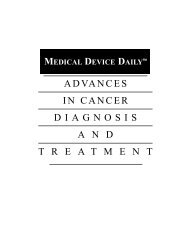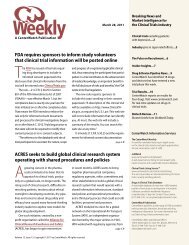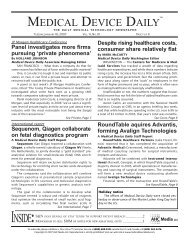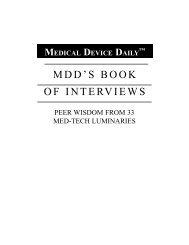MEDICAL DEVICE INNOVATION - Medical Device Daily
MEDICAL DEVICE INNOVATION - Medical Device Daily
MEDICAL DEVICE INNOVATION - Medical Device Daily
Create successful ePaper yourself
Turn your PDF publications into a flip-book with our unique Google optimized e-Paper software.
150<br />
Vital Therapies pushes ELAD<br />
past funding roadblocks<br />
By OMAR FORD<br />
<strong>Medical</strong> <strong>Device</strong> <strong>Daily</strong> Staff Writer<br />
Vital Therapies (San Diego) might be closer to bringing<br />
the Extracorporeal Liver Assist <strong>Device</strong> (ELAD) to market<br />
with its recent report of starting a third clinical phase trial<br />
for the device in September, but funding is still a concern<br />
for the small med-tech company, which has run out of cash<br />
twice in the past.<br />
“Is funding an issue, it’s always an issue with any small<br />
med-tech company,” Terry Winters Vital Therapies CEO told<br />
<strong>Medical</strong> <strong>Device</strong> <strong>Daily</strong>. “We’re not a Medtronic or a Pfizer. But<br />
I think we’ll overcome any funding issues because we’ve<br />
got some of the best investors in the medical device industry.”<br />
Since Winters joined the company back in 2003, nearly<br />
$40 million of funding has been raised. The latest round of<br />
funding occurred in 2007, when the company raised $28<br />
million.<br />
ELAD, which has garnered the support of investors<br />
such as Versant Ventures (Menlo Park, California), is more of<br />
a biological machine than a device, according to Winters. It<br />
peforms the liver’s functions outside of the body, creating<br />
essential proteins and cleaning toxins from the body – a<br />
key difference from other devices in the past.<br />
“In no sense of the word is this a filtration device,” he<br />
told MDD.<br />
The device is about the size of a refrigerator, but there<br />
are plans in the future to scale the machine down and get<br />
something more convenient for the clinical setting.<br />
If ELAD gains FDA clearance, then it could provide an<br />
alternative to liver transplants. It could also buy patients<br />
time until a donated organ could become available.<br />
Previous trials of the company have seen more than 120<br />
patients treated in the U.S., UK, China and Singapore. The<br />
company said that the study in China has shown improvement<br />
in survival without transplant in some patients. The<br />
company applied for marketing approval in China in 2007.<br />
Winters said if everything goes according to plan then<br />
the device could be on the market in the U.S. by the end of<br />
2011.<br />
“The best we could do to get this to market in the U.S. is<br />
in two years, and that’s if nothing goes wrong,” Winters<br />
said.<br />
But there have been difficulties in the past. The company<br />
is on its third iteration and previous iterations of the<br />
company have gone bankrupt twice. The first bankruptcy<br />
came during the first ELAD clinical trial and then the second<br />
came during the second phase of clinical trials.<br />
Vital Therapies isn’t the only company that has had difficulty<br />
in trying to bring a liver assisted device to market. In<br />
August of last year Arbios Systems (Waltham,<br />
Massachusetts) suspended its operations in a move that it<br />
<strong>MEDICAL</strong> <strong>DEVICE</strong> <strong>INNOVATION</strong> 2010<br />
said was a way to conserve cash while seeking financing to<br />
fund clinical trials for its Sepet Liver assist device.<br />
The device was intended as a bridge-to-transplant for<br />
patients waiting for a new liver – a list that is more than<br />
17,000 names long. Sepet is a sterile, disposable cartridge<br />
containing microporous hollow fibers with permeability<br />
characteristics. When a patient’s blood is passed through<br />
these fibers, blood plasma components of specific molecular<br />
weights are expressed through the micropores, thereby<br />
cleansing the blood of harmful impurities (hepatic failure<br />
toxins as well as various mediators of inflammation and<br />
inhibitors of liver regeneration).<br />
Sepet was designed for use with standard blood dialysis<br />
systems available in hospital intensive-care units.<br />
There are still some med-tech companies who haven’t<br />
quite run into the funding roadblocks that Vital Therapies<br />
and Arbios have. Both Hepalife (Boston) and HepaHope<br />
(Irvine, California) are also developing devices to assist in<br />
the liver’s functions.<br />
But despite problems and competition, Winters is still<br />
hopeful for the device which had its beginnings at Baylor<br />
College of Medicine in Houston back in 1991.<br />
Winters said it was a difficult plight that small med-tech<br />
companies found themselves in, when it came down to<br />
funding.<br />
“I don’t think any small company should be afraid to<br />
say that (funding is an issue),” he said. “But we’ve got the<br />
clinical data and results to back up [ELAD’s] effectiveness.”<br />
(This story originally appeared in the Aug. 17, 2009, edition<br />
of <strong>Medical</strong> <strong>Device</strong> <strong>Daily</strong>)<br />
To subscribe, please call <strong>MEDICAL</strong> <strong>DEVICE</strong> DAILY Customer Service at (800) 888-3912; outside the U.S. and Canada, call (404) 262-5547.<br />
Copyright © 2010 AHC Media LLC. Reproduction is strictly prohibited.


